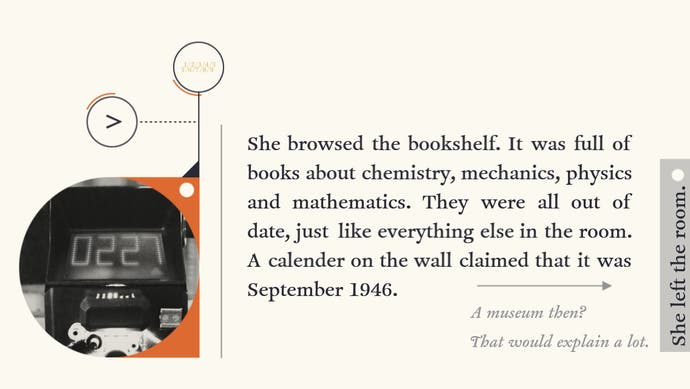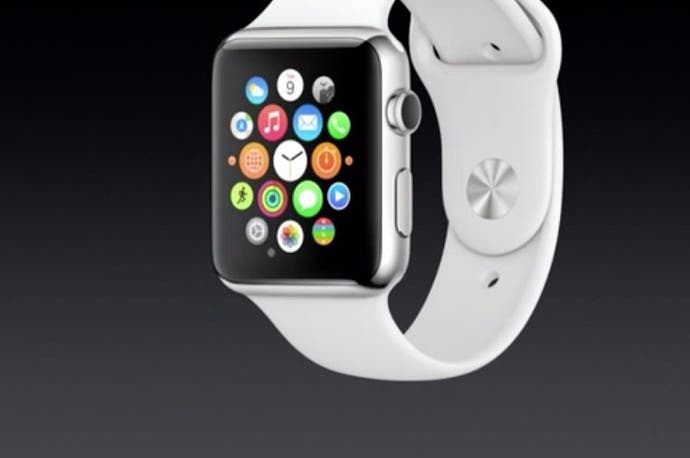Could the Apple Watch become one of gaming's Galapagos Islands?
Games can delight on the platforms least suited to them.
I am not sure about the Apple Watch - which, when a single object costs as much as this does, means that I am sure that I am not going to buy one any time soon. Early reviews suggest that this a device you need to actually create a new gap in your life for: you must find a way to love the various strange things it is good at, and forgive all the things it's not so brilliant with. Go deeper and things get weird. The Apple Watch protects you from the tyranny of your own phone, apparently. That is nice to hear. Maybe something will come along in a few years that will protect you from the tyranny of your own watch, too. Maybe your phone and your watch will start to gang up on you. Maybe a turf war will race all the way from your pocket and up your arm, headed for the ear where Apple products will start to crawl inside your head and clamp painlessly onto your limbic system.
That said, as soon as anyone I know does buy an Apple Watch, I'm going to want to have a bit of a play around with it. There's this new kind of haptic feedback that feels more like a tap than a buzz, apparently. That sounds fun. Also, I want to see how my enormously fat fingers interact with a screen of that size. The thing I am most intrigued by - excited is too strong a word - is games, though. I love it when games travel to places that seem uniquely unsuited to them. Sure, you get a lot of dross, a lot of botches, but you also get to see designers at their best: wrangling with strange, seemingly intractable platforms in a bid to make new kinds of fun. Like those horizontal willow trees quietly growing along the ground in islands situated above the arctic circle, it is great to see games flourish where games are clearly not meant to be.
And initial Apple Watch games seem quietly interesting. Spy_Watch is probably the one to keep an eye on, a Bossa Studios title that the team's referring to as a 'background game'. That terminology doesn't seem enormously promising, but it seems to mean that we may be about to see a spate of games that muddle around with perspective and player role a little bit. You're not the spy in Spy_Watch, you're the spymaster, dispatching your agent across the globe and then waiting, in real-time, for messages to come back. What should I do in this situation, boss? Here are my options. This is a clever way of doling out a little light gameplay in five second parcels, and it's a nice reminder that games generally make you the star, and yet there are plenty of other positions available.

Spy_Watch is also an indicator that the loop designers work with can get much smaller. A while back I remember talking to the lovely Mustard Brothers at Chair Entertainment about the differences between a game like Shadow Complex and one like Infinity Blade. The main difference, they told me, was that when you've got the player sat on a sofa with the big screen looming, you can assume you have an hour cleared in their schedule. For a phone game, you have to work with two minutes. With the watch, that goes down to 15 seconds tops, most likely, and then there's the fact that one hand will be out of action.
If this sounds like an invitation to slice away at a game until only the strangest shard of the core idea remains, welcome to another Apple Watch game: Snappy Word. As far as I can tell, Snappy Word is Boggle, in essence, but it's Boggle with a grid of just four letters. If you're new to word games, this probably sounds dull. To the seasoned Boggle player - and I hope I am amongst friends here - it sounds like carnage, a bloodbath. Snappy Word could be the Baby Park of puzzlers. There is something to be said for focus.
I'm not thinking that the Apple Watch is going to change gaming, of course. I'm still not sure it's going to change watches, and I hope it doesn't, really, as its various SKUs, their pricing and materials, suggest it's kind of a grotesque proposition at heart. What I hope, though, is that it will show once again the flexibility of gaming, the way that games can take purchase just about anywhere. Pondering this gives me the same kind of pleasure I got at Rezzed when I played Line Wobbler, a dungeon-crawler that unfolds on a length of LED flex, your single pinprick hero steadily racing across the desk and then up the wall and onto the ceiling. It's the same sort of pleasure I get from ABaroids, that game that plays out in the address field of your browser.
Forget those arctic trees, in fact, and head south a bit. Things like the Apple Watch can be gaming's Galapagos Island: a place where isolation and strange circumstances force life to get truly creative. Spy_Watch and Snappy Word are both relatively traditional games once you get to grips with them, just kinked gently to fit their new homes. But they're enough to suggest that a few cycles out we might get to play something truly odd.

